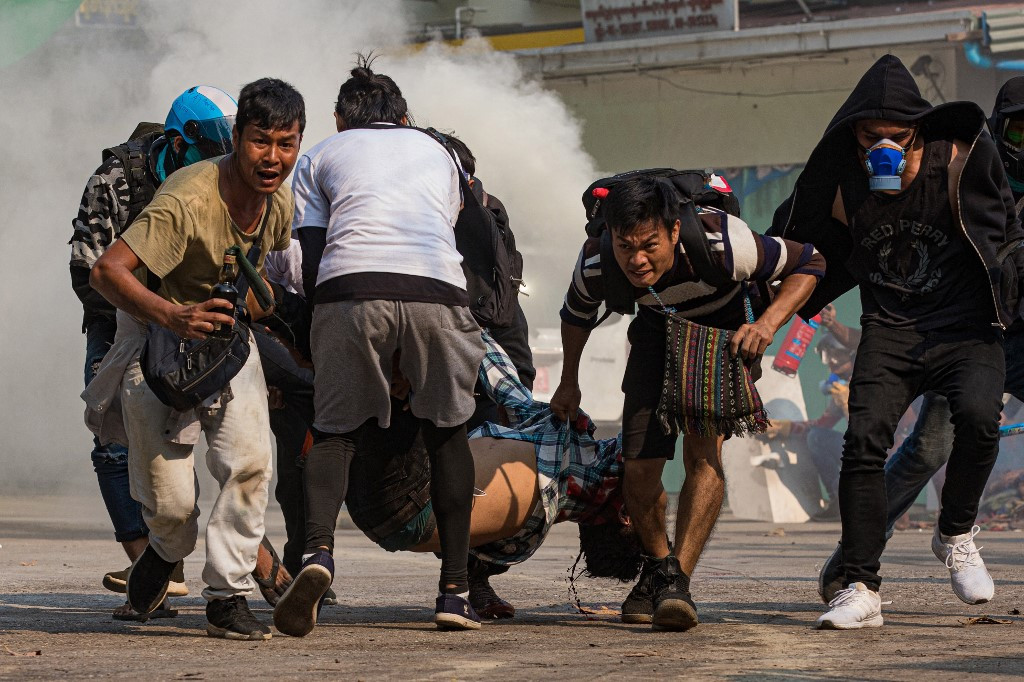Popular Reads
Top Results
Can't find what you're looking for?
View all search resultsPopular Reads
Top Results
Can't find what you're looking for?
View all search resultsStrategic stakes running high in ASEAN summit on Myanmar
There appears to be no end in sight to the violence, despite pleas and condemnations from all around the world.
Change text size
Gift Premium Articles
to Anyone
M
yanmar’s post-coup humanitarian crisis continues to unfold with at least 550 casualties, including children, and almost 3,000 detainees by now. There appears to be no end in sight to the violence, despite pleas and condemnations from all around the world.
Some have called for the United Nations to act based on the Responsibility to Protect (R2P) principle. But R2P tools short of military intervention, such as embargoes, sanctions or International Criminal Court prosecution, may not move the needle. Indeed, it is unclear whether the targeted sanctions preferred by the likes of the United States and United Kingdom would change the Tatmadaw generals’ calculus.
We also cannot easily rule out a “Libyan quagmire” scenario if there is a full-blown military intervention or a Chapter VII peacekeeping mission in Myanmar. In any case, UN Security Council (UNSC) actions are likely stuck with Russia and China holding veto powers. Vietnam, the UNSC president for April, doesn’t appear keen to prioritize the Myanmar crisis it deems an “internal affair”.
Meanwhile, regional powers with serious leverage in Myanmar – China, Russia, India, Japan, Thailand, Singapore and the US – won’t work closely in concert given their diametrically opposed strategic interests. Without such a concert, the domestic balance of power in Myanmar is unlikely to shift significantly sans a prolonged civil war or an intra-military coup.
Indonesia on the other hand had led the efforts to put ASEAN front and center to address the crisis. A few weeks ago, President Joko “Jokowi” Widodo called for an ASEAN special summit. The strategic stakes in the summit, expected to take place later this month at the ASEAN Secretariat in Jakarta, are high.
What happens in Myanmar does not stay in Myanmar. If the crisis worsens, Southeast Asia might be overwhelmed with multiple crises at once, from refugees fleeing the country, exploding drug trafficking and transnational crimes to a worsening pandemic and slower economic recovery.
Read also: ASEAN summit on Myanmar to be held in Jakarta: Brunei and Malaysia
If the crisis escalates into a full-blown civil war, especially with regional powers playing proxies, Southeast Asia’s strategic environment will worsen in ways not seen since the Cambodian-Vietnamese war in the late 1970s. By then, whatever window of opportunity ASEAN has to play the role of a constructive “honest broker” would have evaporated.
For ASEAN, the summit will be yet another test of its institutionalized “legal personality”. The ASEAN Charter and its sprawling institutions has given the group ways to circle around a problem by discussing “agreeable”, nonsensitive subjects until everyone forgets what the real issue was. In other words, one creates the impression of doing something without achieving much by invoking ASEAN institutions.
The key question for the upcoming summit is whether Brunei is prepared to push all the member states to only focus on the Myanmar crisis and not some other community building programs. It is also unclear whether there could be meaningful progress by bending over backwards to accommodate the representative of the State Administrative Council. If anything, ASEAN’s latest attempt to do so—at the informal foreign ministers’ meeting in early March—suggests we should temper expectations.
If the summit makes Myanmar a “decorative” agenda point rather than the primary issue to discuss, it is a failure from the start. To be successful, the summit should at least decide on a framework to end the violence.
If it can also agree on long-term solutions to the broader problems of peace and democratic transition, all the better. One idea to consider is a combination of immediate steps (e.g., humanitarian pause to deliver aid and relief) and longer-term mechanisms for dialogue among the conflicting parties to decide on a possible transition into democratic federalism.
In any case, ASEAN should play a central role throughout these processes; similar to its Humanitarian Task Force assembled after the 2008 cyclone Nargis disaster. Without “skin in the game”, ASEAN is unlikely to have the capital and reach to move the process forward in Myanmar beyond pleas and statements.
Read also: ASEAN struggles between need for consensus, standing by principles
For Myanmar, the summit is perhaps its best shot at getting a diplomatic partner in its corner without an intrusive political agenda. If the parties in Myanmar cannot fully trust China or the US, for example, an ASEAN-facilitated table might not look so bad. The external parties, meanwhile, are also out of acceptable and workable options. If their sanctions and embargoes cannot move the needle, can they be at the forefront of a diplomatic table to facilitate an end of violence and return to democracy in the long run?
Finally, for Indonesia, the summit is a serious test of its leadership and credibility, especially since President Jokowi himself publicly made the call. Jakarta should make it clear that, even though the summit was its suggestion, it is not going to accept some “lowest common denominator” outcome as usual.
If the summit fails to address the crisis in any meaningful way, then there is little reason to expect ASEAN can thrive without overhauling its charter. ASEAN members, especially Indonesia, should also consider their own strategic options moving forward without relying on—and being constrained by—ASEAN institutions. Indonesia has a clear strategic interest to ensure a peaceful resolution in Myanmar and the return to democracy. It might need to decide soon whether ASEAN can still be the best vehicle to achieve that outcome.
***
Lina Alexandra and Evan A. Laksmana are senior researchers at the Centre for Strategic and International Studies (CSIS) in Jakarta.










